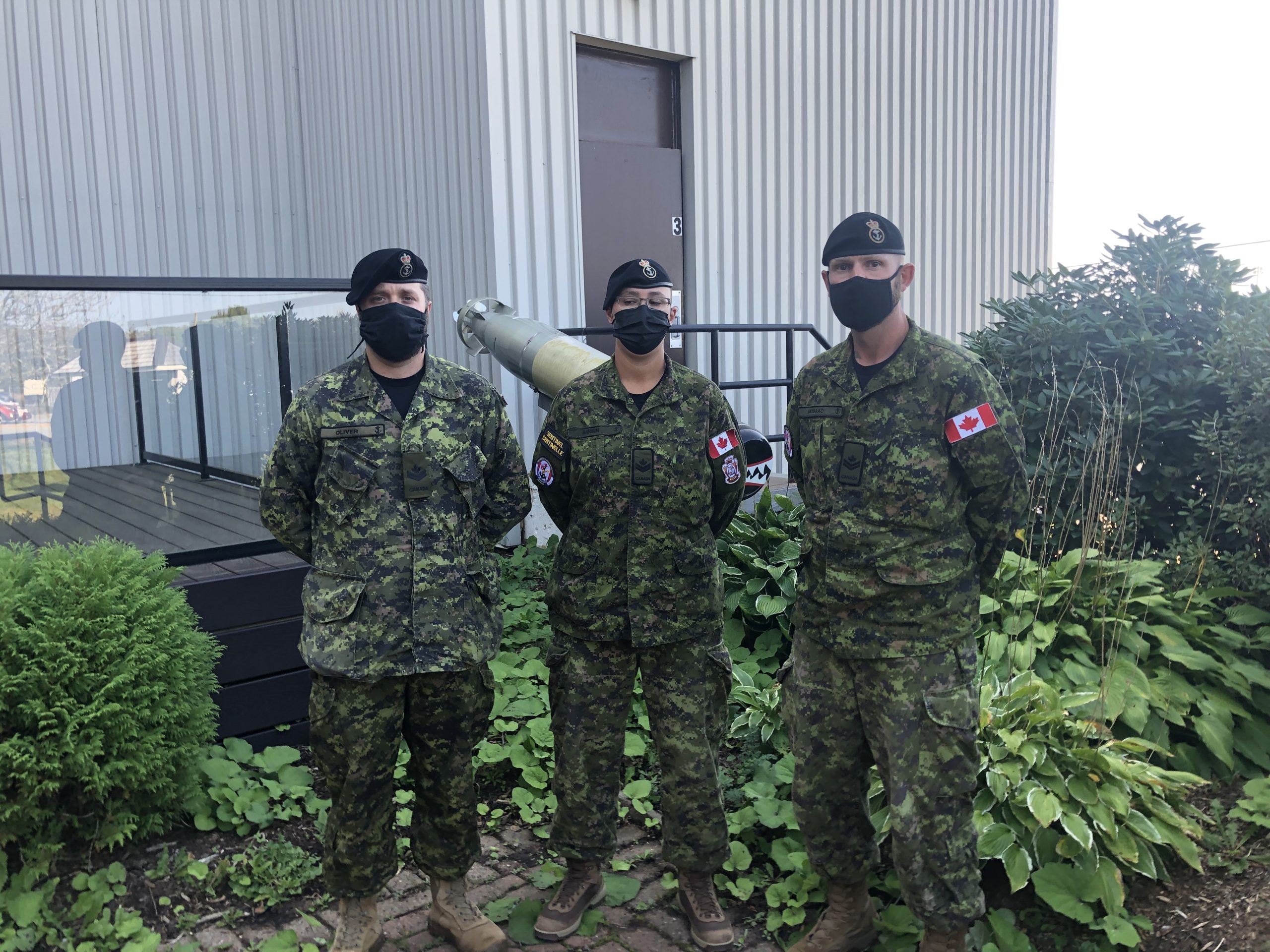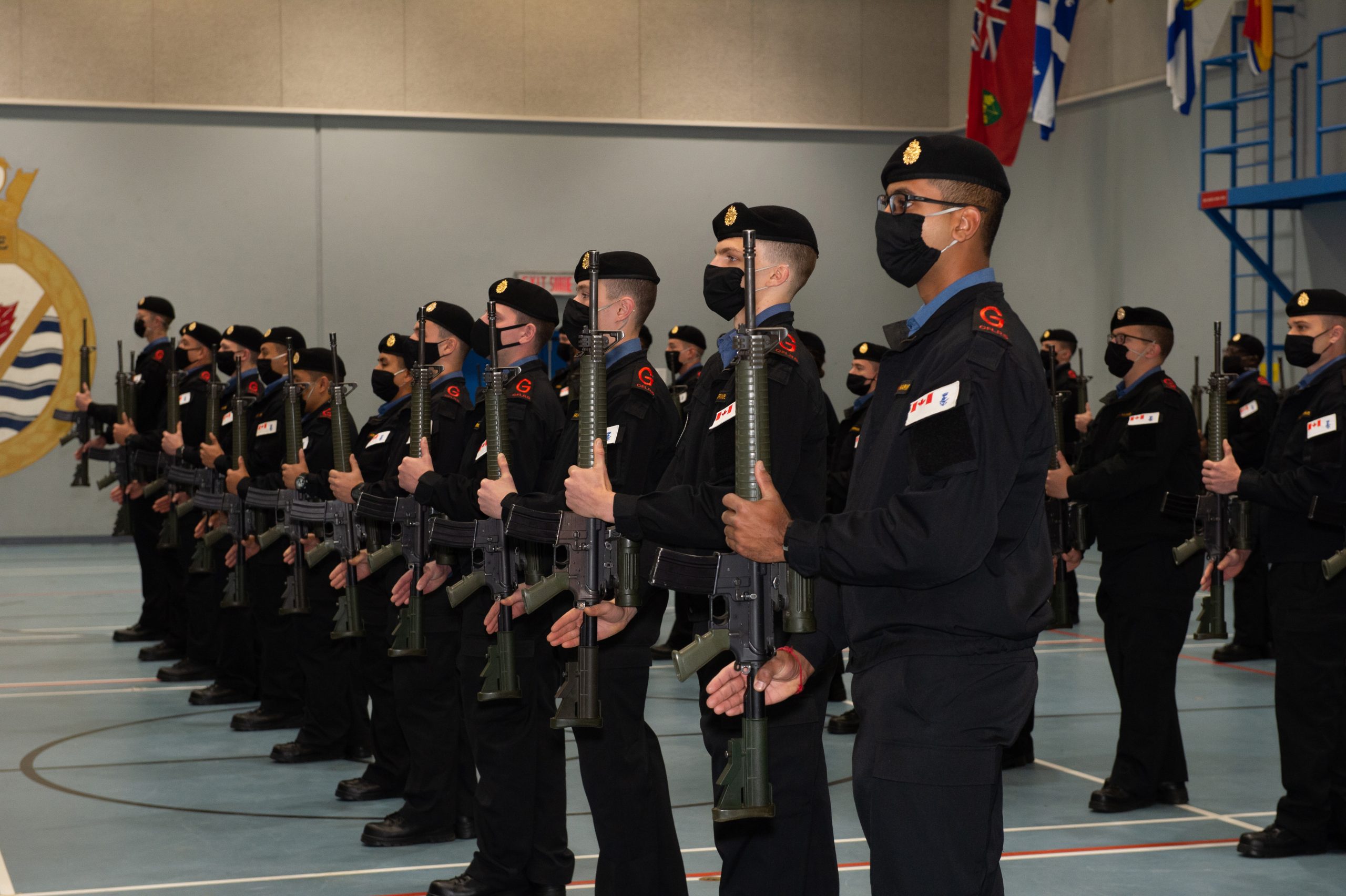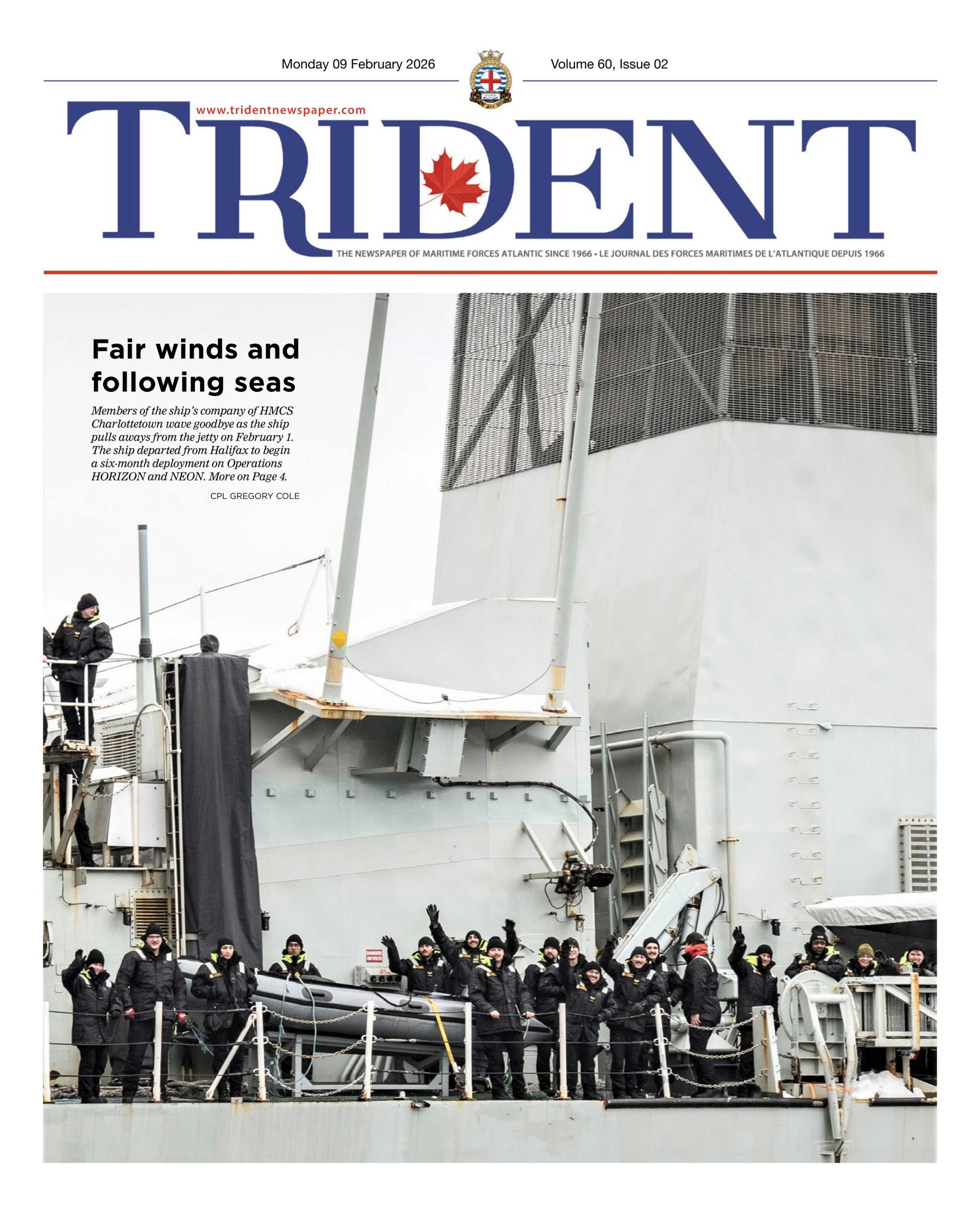
From left, MS Mike Oliver, MS Lindsay Hansen and MS Gus McIsaac are instructors at the D-BMQ course currently taking place at 12 Wing Shearwater.
JOANIE VEITCH, TRIDENT STAFF
Leading D-BMQ is hard work, but rewarding, instructors say
By Joanie Veitch,
Trident Staff
When Master Sailor Gus McIsaac heard about an opportunity to take the General Military Training Instructor (GMTI) course last summer, he jumped at the chance.

Please credit: Sailor 1st Class (S1) Sisi Xu, MARPAC Imaging Services, Esquimalt
“I’ve always wanted to instruct at Basic Training. I remember when I went through it myself and the influence my instructors had on me… it really stayed with me,” he said.
Now the lead instructor at the Atlantic De-centralized Basic Military Qualification (BMQ) course at 12 Wing Shearwater, MS McIsaac said it’s a tough job, but one of the best experiences he’s had in the military since he joined in 2007.
“Excluding deployments, this is probably the hardest I’ve worked while I’ve been in the Canadian Armed Forces. You’re up at 5 a.m. and the days are long but… to deliver a lesson on something, and then see them applying the knowledge and skills you taught them, it’s incredibly rewarding,” he said.
While BMQ normally happens at the Canadian Forces Leadership and Recruit School in Saint-Jean-sur-Richelieu in Québec, training was de-centralized last fall to continue to recruit and train new personnel in a “persistent” COVID-19 environment.
This September the fourth D-BMQ course started at 12 Wing Shearwater, with naval recruits arriving from all across Canada and going through two weeks of isolation before beginning the 10-week course that includes classroom instruction, parade drill, field training, weapons training and range practice, along with first aid, basic fire fighting skills and physical fitness training and testing.
It can be challenging to adapt the program through various COVID posture changes at Maritime Forces Atlantic Formation (MARLANT) but overall the East Coast D-BMQs have been successful as everyone works to accommodate and adapt with each new course, said Lt(N) Kieran Higgins, Company Commander BMQ at Naval Fleet School (Atlantic).
“The first D-BMQ was definitely a steep learning curve but we’ve learned a lot and continue to make improvements as we go. We’re exceeding our target goals for the number of recruits trained and that’s a testament to the excellence of our instructors,” said Lt(N) Higgins.
There are 52 recruits going through Basic Training at 12 Wing Shearwater this fall, which works out to a one to six ratio of instructor to students. The target number for each d-BMQ is 55 recruits, said Lt(N) Higgins.
Like MS McIsaac, Master Sailor Lindsay Hansen was eager to sign up for the GMTI course last fall. Now having taught three of the four BMQ courses held over the past year at Shearwater, she said she loves seeing how the recruits’ mindset begins to shift as they get to the mid-point of the course.
“Around about week five or week six you see them really start getting it. You watch them go from not understanding the military lifestyle at all to start functioning as a team. It’s seeing that transformation from being an ordinary civilian to being a military member. I love when I see that cohesiveness happen and know I had something to do with it,” she said.
As the only female instructor at present, MS Hansen said she enjoys watching how the female recruits — there are nine in the current session — bond as they go through the course.
“There are so few of them, they come together and really work as a team. I like to see that,” she said.
De-centralized BMQs are taking place on both the east and west coasts for naval recruits. Having Royal Canadian Navy recruits being taught by RCN staff has been a definite bonus to the new model, said Lt(N) Higgins.
“It’s great exposure for them, right from the start they get to meet senior sailors, some of whom they will be working for down the road. It gives them a picture of what life will be like in the Navy,” he said.
As a new recruit with plans to work as a Marine Technician, Zane Clarke said he had visions of the boot camp scenes from Full Metal Jacket running through his head when he arrived at Shearwater, but now more than halfway through the program, those worrisome thoughts are far behind him.
“It’s been good, really good. It’s a much healthier environment than I was expecting,” said Clarke. “It can be stressful at times, yes, but not in a bad way. The instructors are fair but firm. Every week the standard is raised and it’s clear that they want you to succeed.”
For Master Sailor Mike Oliver, an instructor who has taught three courses of D-BMQ, finding success as an instructor comes from experience, and learning to tailor his leadership style to the student in front of him.
“GMTI sets you in the right direction but it’s teaching that first course where you really learn how to do this,” he said. “In this course we have a lot more younger recruits so you have to be able to adjust how you approach each candidate. For some, being more direct is what works but others need a more compassionate style. For a lot of them, it’s their first time away from home and they’re like a deer in the headlights when they first get here.”
Admitting she’s a “sucker for a good challenge,” 22-year-old Rebecca “TJ” Long said she’s thoroughly enjoying her experience and credits the instructors for their ability to motivate and make the course fun, even when it’s tough going.
“The instructors are great. They work with you and help you work through problems when you’re struggling. They know your growth zone and your panic zone and how to help you bring it back in when you’re feeling overwhelmed… and there’s a good dose of humour there too,” she said.
Graduation is scheduled for November 12.






